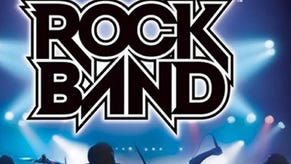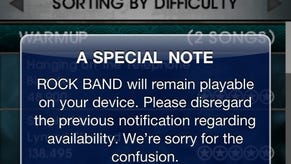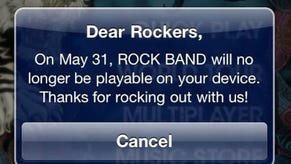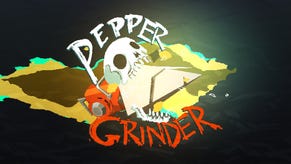Rock Band
The enemy makes friends.
It's worth pointing out, for all that, that you can't actually take Band World Tour online, meaning that you will need to shelve your band whenever your friends can't come over unless you're happy to play individual co-op songs over the Internet. Apparently there will be a patch for online Band World Tour, but that's not much use right now. So that's a bit irritating. What's more, you can't simply pick up the game and play any track as a group until you've unlocked them - either in Band World Tour or one of the solo modes - which limits the game's appeal as a casual party activity until you've done so. On the plus side, any cash you amass with solo work can be carried over to the Band World Tour mode.
But it's the individual peripherals and their implementations that throw the most spanners into Rock Band's hefty works. Most notably, each instrument requires its own USB slot, so PS3 players who bought the revised console with only two USB ports will need to invest in a USB hub to plug everything in, whereas Xbox 360 owners will not because one is supplied. The microphone gameplay suffers from the SingStar-esque "features" of allowing you to get away with singing anything (not such a bad thing, admittedly, since you'll want to substitute "very" for "f***ing" during Radiohead's Creep) and asking you to elongate words robotically when you'd naturally let them taper off.
The guitar, in this case, is based on the Fender Stratocaster (Guitar Hero controllers are modelled on Gibsons). The key differences are size (the neck is about 10 centimetres longer), an effects pickup switch (allowing you to switch between wah-wah, flange, chorus, echo or no effects, although this is little more than a gimmick) and the five additional fret buttons, but there are other things to note too. On PS3 the guitar is wireless with a USB dongle attached to the console, but on Xbox 360 it's wired; the battery compartment is screwed closed rather than a TV remote-style clip as with Guitar Hero III's Les Paul, and takes three AA batteries rather than two; and while you can add a second guitar to bring in a bass player, at the time of writing Harmonix has yet to issue a PS3 patch to enable compatibility with Guitar Hero's controller, claiming that Activision is blocking it (360 is fine), and the Fender is only sold as part of the bundle, not separately.
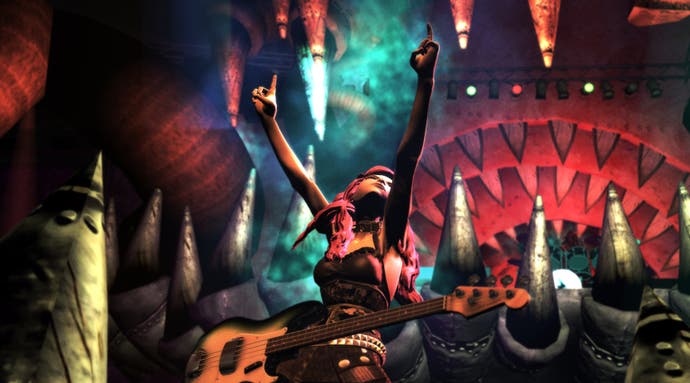
The fret buttons themselves are smooth rather than raised ala Guitar Hero, but they also feel stickier, and it's hard to move between them and those closer to the body for solos without missing a few notes in and around the solo section due to their relative lack of definition. Given how dense the solos often are with notes, fumbling that transition can be painful. Raised dots on each fret are meant to help you feel for them instinctively, but they're a bit small to rely on, whereas Guitar Hero's raised frets are inherently better at announcing themselves to your fingers without a sideways glance.
Perhaps the biggest difference though is the strum bar, which doesn't click when it's moved up and down as with the Guitar Hero controller - a change which requires adjustment on the part of the player. Guitar Heroes used to strumming up and down alternately will probably do alright, but those still relying on repeated downward strums may find themselves failing where they succeed in Guitar Hero, as the softer strum bar reaction can lead to your absently not allowing it to reset to the middle fully before strumming again. Other elements, like the whammy bar, are just as effective, and the ability to re-screw the strap attachment for left-handers rather than pinning the strap to the back of the neck as you do on the Les Paul is nice, but it seems odd to demand adjustments when it's the same developer. Perhaps patents were problematic.
Either way, Guitar Hero devotees will want to bear these things in mind. Another cause for their concern is the difficulty level, which is certainly lower than GH3's. Some will applaud that - we're certainly not bemoaning the accessibility - but given Harmonix's expertise, again, it seems odd not to scale higher as well as lower.
The drums are great, at least. You can adjust the height, reverse them for left-handers (and move the kick-pedal across the frame underneath depending on which foot you use), and while the combination of rubber pads and foam below doesn't give them much bounce, complaints are likely to be few, apart from the odd newbie whose foot will hurt until they find a comfortable position. The drumsticks themselves are splendid, too - quite light, but wooden and decidedly realistic.
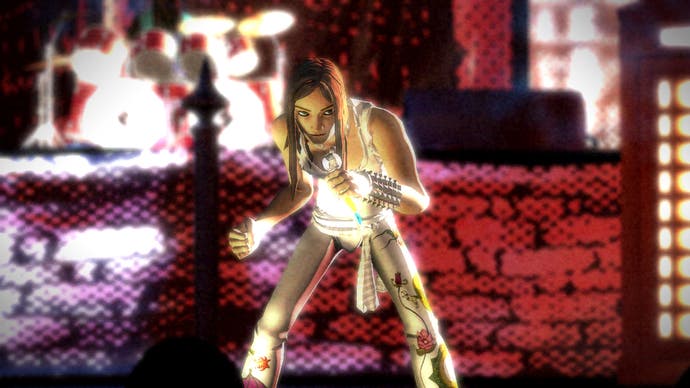
But in-game the drum-set's implementation can be a bit lacklustre. Whereas guitars and vocals are pushed high in the mix, drums are not, which makes it difficult to pick your way past unexpected syncopation and other awkward passages. Fortunately the game comes with a practice mode for each instrument, but greater separation and tutelage might have been welcomed.
So, there are certainly criticisms relating to the structure and some peripheral quirks (not to mention reliability concerns, although Harmonix claims these have been solved in subsequent production runs), and the usual subjective arguments about track listings, but on the whole we're talking about growing pains. You can make the argument that a lack of single-player strength and diversity is galling - and I'd second the argument that a single-player Band World Tour mode would make sense, particularly as two- or three-player bands are filled out with AI band-mates anyway - but on the whole you wouldn't buy this unless you knew what it was about, right?
As it stands, the score below reflects the game as a brilliant multiplayer experience that delivers on its ambitious premise, but not without a few reservations both in software and hardware. Karaoke and guitar specialists certainly won't want to throw out their SingStars and Guitar Heroes, but with the peripheral set-up now established and regular infusions of downloadable content, the future's bright for Rock Band - and the present's pretty rocking too.

